Thu 31 Mar 2011
Back to the Source
Posted by Ethan under Film Review, NYC Film Critic
Comments Off on Back to the Source
After a fairly lethargic March, April kicks off with a weekend full of fresh releases. Read capsule reviews of six of the new movies that can be found in theaters tomorrow (including the Jake Gyllenhaal thriller Source Code, pictured above) after the jump.
Source Code
Directed by Duncan Jones
Written by Ben Ripley
Starring Jake Gyllenhaal, Michelle Monaghan, Vera Farmiga
***1/2
Duncan Jones’ 2009 directorial debut Moon was something of a rare beast: an honest-to-God science-fiction drama, as opposed to an action movie or thriller dressed up in futuristic clothing. Unlike a lot of first-time filmmakers, Jones didn’t try to wow the audience with style. Instead he focused his energies on telling a straightforward and satisfying story about a character you actually gave a damn about. (In fact, one of my few complaints about the film was that the narrative was almost too straightforward—I kept anticipating a final plot twist that never came.) Jones’ sophomore effort Source Code is a twistier and more action-packed sci-fi tale than Moon, but, thankfully, it’s still first and foremost a character-centric piece. Jake Gyllenhaal delivers what may be his best performance ever (and for a Gyllenhaal-phobic guy like me, that’s extremely high praise) as Colter Stevens, a military pilot that is unexpectedly drafted to carry out a top-secret mission. A commuter train has blown up just outside of Chicago and, using a revolutionary new process known as “source code,†military scientists have managed to create a digital version of the eight minutes leading up to the explosion. Stevens’ mind is then placed in the body of one of the train’s passengers with orders to find the bomber. And because this “reality†is actually just a bunch of 1’s and 0’s, the poor guy can re-live those eight minutes (as well as the explosion) again and again until he completes his assignment. Among Source Code’s many pleasures—which include a swiftly-paced 90-minute runtime, welcome dashes of humor and general Alfred Hitchcock-meets-The Twilight Zone-meets Groundhog Day vibe—is the general refusal by Jones and screenwriter Ben Ripley to engage in any clunky exposition. The film drops you right into the action alongside the hero and you only discover the exact circumstances of the mission as he does. It’s a well-told sci-fi yarn…at least until the last five minutes when the filmmakers willingly violate the rules they’ve carefully established in the name of throwing the audience one last curveball. At that point, the movie careens off the tracks and I found myself actually slumping in my seat in disappointment. But I enjoyed the rest of Source Code so much that I’ve since chosen to mentally erase those closing scenes and freeze-frame on what should have been the movie’s final image. (Don’t worry, I won’t reveal the specific shot here, but you’ll know it when you see it.) Based on his first two features, I have no doubt that Jones has a long career ahead of him so he’ll have plenty more chances to craft the perfect ending that eludes him here.
————————————————————————————————————————————————————————-
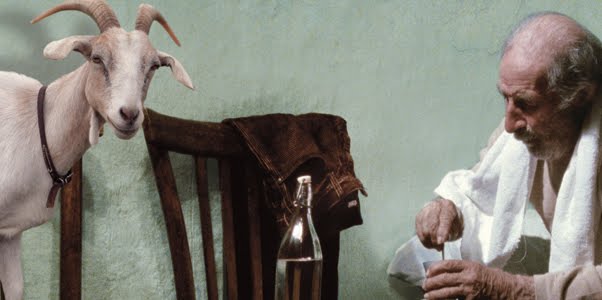
Le Quattro Volte
Written and Direced by Michaelangelo Frammartino
Starring Giuseppe Fuda, Bruno Timpano, Nazareno Timpano
***1/2
Regular readers know that I tend to respond positively to movies that possess a strong sense of place. Too often, location is treated as an afterthought, but when used properly it can be as important a presence as any of the human actors that pass through the frame. That’s certainly the case with Michaelenglo Frammartino’s hypnotic film Le Quattro Volte (which translates as “The Four Timesâ€), in which the setting—a tiny village in the rolling Italian hills—is also the film’s central character. It’s the kind of town that seems entirely removed from the world, to the point where the film could be taking place in the present day or five decades ago and we’d never know the difference. Frammartino splits the movie into four distinct sections, the first of which features the town’s elderly shepherd (Giuseppe Fuda) who is nearing the end of his life. After he passes away quietly one afternoon, the movie’s point-of-view shifts to a newborn goat from the deceased’s former flock. While out grazing with the herd, the unsteady kid stumbles into a ditch and emerges to discover that he’s been left behind. His story draws to a close with him vainly seeking refuge as the harsh winter sets in. The following spring, Frammartino directs our attention towards a towering fir tree that is felled to serve as the centerpiece for one of the village’s annual festivals. For a short while, the tree is celebrated as an almost holy object—then the celebration ends and it is chopped up and sold to the owners of a charcoal kiln. The final chapter depicts in somewhat painstaking detail how the kiln is built and the wood is transformed into coal. You probably see a pattern emerging here—each of the film’s four sections presents a small slice-of-life that ends in death, sometimes literal (as in the case of the shepherd and, likely, the young goat—though we don’t actually see him perish, it’s safe to assume that he doesn’t survive the winter) and sometimes metaphorical (that enormous tree). Frammartino invites us to observe this process sans dialogue or conventional plotting; the closest the movie comes to a traditional set-piece is a funny extended sequence (shot in one take) involving the shepherd’s goats, a runaway truck and a very earnest sheep dog. I’m not going to pretend that Le Quattro Volte will be of interest to everyone; in both style and content, it’s a simple, spare movie that demands a high degree of patience. But thanks to Frammartino’s inquisitive camera and the sheer beauty of the setting, I fell under its spell early on and remained captivated throughout.
————————————————————————————————————————————————————————-
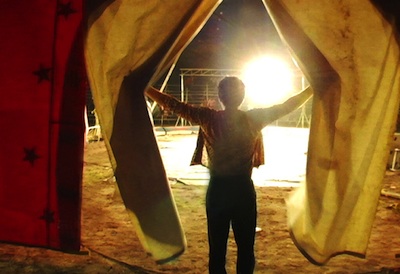
Circo
Directed by Aaron Schock
***
The circus may be the setting of Aaron Schock’s first documentary feature, but the movie’s primary subject is family. A former community development worker-turned-filmmaker, Schock spent several months embedded in the traveling caravan of the Gran Circo Mexico, an independent big-top that traverses rural Mexico, performing its spectacles of strength, agility and derring-do to not-exactly packed audiences. It may not be as impressive an operation as, say, Barnum & Bailey, but the Gran Circo Mexico has an equally illustrious history. Operated by the same family for almost a century, the circus is something of an institution but it faces an uncertain future due to the nation’s depressed economy and, more importantly, generational conflicts amongst its owners. At the center of the dispute is Tito Ponce, ringmaster and eldest son of the head boss. A staunch believer in tradition, Tito will do whatever it takes to keep the circus up and running, including making his own wife and young children toil long hours both in the ring and behind the scenes. But his single-minded devotion to maintaining the Ponce legacy is putting an increasing strain on his marriage. It doesn’t help matters that most of Tito’s grown siblings have jumped ship, opting to settle down in one place instead of continuing the nomadic lifestyle of circus folk. Eventually he’s forced to decide between his two families, but for him, there’s really no choice at all. Whether he was aware of it or not, in choosing this particular circus to profile, Schock stumbled upon some exceptionally compelling human drama, from Tito’s fraught relationship with his wife to the unseen, but keenly felt pressure placed upon him by his elderly mother and father. Some of the most interesting figures in the film are his children, who perform many of the circus’ signature acts and are also expected to perform other tasks, including setting up and taking down the tent and selling concessions. While the kids admit to enjoying the freedoms offered by a life on the road, they also speak wistfully of wanting to experience such ordinary pleasures as going to school or having a girlfriend. At only 75 minutes, Circo is too cursory at times; Schock never gives us a clear sense of the circus’ daily routine (I was curious to learn how they keep the animals properly fed and cared for, for instance) and it would have been nice to hear more from certain individuals, most notably Tito’s elusive father as well as his younger brother who leaves to pursue a romantic relationship before ultimately returning with his girlfriend reluctantly in tow. Nevertheless, the difficulty of this man’s predicament—torn between the family he comes from and the family he created—lends the movie considerable dramatic weight.
————————————————————————————————————————————————————————-
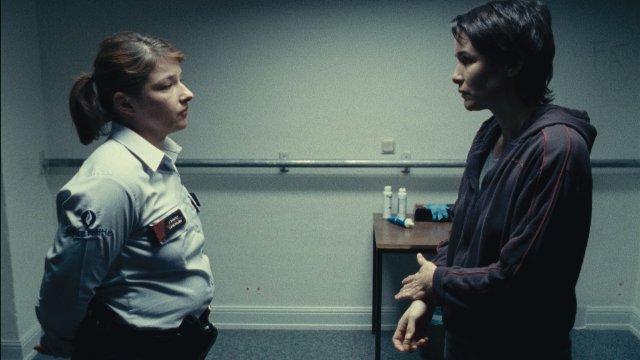
Illégal
Written and Directed by Olivier Masset-Depasse
Starring Anne Coesens, Alexandre Gontcharov, Milo Masset-Depasse
***
Although made in Belgium, Olivier Masset-Depasse’s drama depicts a scenario that should resonate on these shores as well. While escorting her teenage son home from school one afternoon, Tania (Anne Coesens) is stopped by two police officers and asked for her identification papers. As we know (though the cops don’t…yet) she’s been living in Belgium illegally for almost ten years and has so far managed to avoid detection. Today, however, her luck runs out. After creating a distraction that allows her son to escape, she’s taken to an immigrant detention center and assigned a room that she shares with a mother and her young daughter and another woman who is the frequent victim of abuse by some of the institution’s crueler employees. Initially planning to remain silent in the hopes that the authorities will be forced to release her due to lack of evidence, Tania eventually reveals her identity and requests asylum, only to be faced with deportation instead, an order that—in the movie’s most wrenching scene—is almost carried out by force. Masset-Depasse has said that he based this fictional account on several documented incidents of human rights abuses within the Belgian immigration system, incidents that were apparently harsh enough to attract the attention of the European Court of Human Rights. Certainly, the film’s sympathies lie with the immigrants, as the writer/director depicts the various law enforcement and immigration agents as either stern, brutal or simply naïve. To be honest, Masset-Depasse does slather on the tragedy a little thick at times, as if he’s concerned that viewers won’t empathize enough with his characters’ plight. (The sad thing is that he may not be entirely wrong about that—as we’ve seen in this country, anti-immigrant fervor can make certain groups of people all too eager to deny others basic rights.) Still, Cosesens’ impassioned performance and the parallels to the immigration debates raging in America right now make Illégal an involving film.
————————————————————————————————————————————————————————-
In A Better World
Directed by Susanne Bier
Screenplay by Anders Thomas Jensen
Starring Mikael Persbrandt, Wil Johnson, Eddy Kimani
**1/2
“Melodrama†isn’t a popular word these days, largely because it’s often done so badly. But Danish filmmaker Susanne Bier is one of the finest practitioners of this tricky dramatic form currently working. In movies like Brothers, After the Wedding and Things We Lost in the Fire, she chases after big emotions without going so far over the top that the films become parodies. (She’s also capable of coaxing exceptional performances from her actors; Halle Berry and Benicio Del Toro have rarely been better than in the sadly underseen Fire.) Unfortunately, Bier’s latest film In a Better World—which just took home the Oscar for Best Foreign Language Film—is not the strongest example of her considerable talents. Unlike much of her past work, this film states its central thesis in bold letters early on and goes on to dramatize it in a frustratingly schematic and superficial way. The subject on Bier’s mind is bullying, specifically the way bullies prey upon the meek and how the meek choose to respond. This theme plays out in two connected storylines; in the first, two 10-year-old boys, Elias (Markus Rygaard) and Christian (William Johnk Nielsen) successfully strike back at their school’s resident tormenter and then decide to dish out another round of punishment, this time directed at the gruff auto worker that humiliated Elias’ father, Anton (Mikael Persbrandt). The second thread finds Anton—a doctor that makes frequent trips to a clinic in a refugee camp in Africa—having to treat the local warlord who is responsible for many of the casualties that turn up at his makeshift hospital. The actors are all on point, but the script (by Anders Thomas Jensen) and Bier’s surprisingly heavy-handed direction weighs them down. In a Better World lacks the nuance that distinguishes her best work, hitting every beat a little too neatly. The climax, in particular, can be seen coming a mile away—to paraphrase the old Chekov line, if the rooftop of an abandoned building is introduced in Act 1, you know that someone is going to contemplate leaping off it in Act 3. Bier is too skilled a filmmaker not to wring some tension from the proceedings, but this particular melodrama lacks a key ingredient: drama.
————————————————————————————————————————————————————————-
Cat Run
Directed by John Stockwell
Written by Nick Ball, John Niven
Starring Paz Vega, Janet McTeer, Scott Mechlowicz
*1/2
An extended trailer masquerading as a feature film, Cat Run relies on flashy editing-room tricks (among them split-screens, fast-forwards, rewinds and freeze-frames), chaotic action sequences and sniggering frat-boy humor to try and mask the fact that the filmmakers are working from the thinnest of material. The nominal plot revolves around a pair of American idiots (Scott Mechlowicz and Alphonso McAuley) living abroad in Europe who decide to set up a private detective agency despite having a complete lack of experience in that profession. Their first assignment is to locate a woman named Catarina or, as she’s known to friends and family, “Cat†(Paz Vega) a high-class escort in possession of some damning evidence regarding the sexual proclivities of a corrupt U.S. Senator (Christopher McDonald). Also on Cat’s trail is a lethal English assassin, played by noted character actress and one-time Oscar nominee Janet McTeer. As these characters chase each other across Europe, bullets fly (often in Matrix-style slow motion), people die (often in unnecessarily brutal and sadistic ways) and one of the characters performs Fergie’s immortal pop ditty “London Bridge†while dressed in a kilt (don’t ask). Half-heartedly directed by John Stockwell (a former actor who began his filmmaking career with the better-than-average teen drama Crazy/Beautiful before descending into hack-for-hire work like Into the Blue and this picture), Cat Run feels like a relic from the late ‘90s or early ‘00s, when Hollywood was awash in dumb gun crazy capers like The Boondock Saints and Lucky Number Slevin. The only reasons to endure this mess are the always-lovely Vega and McTeer’s committed attempt to out-snarl and out-shoot Liam Neeson’s avenging daddy character from Taken. (To her credit, the actress comes within striking distance of achieving that goal. In fact, it looks like she’s having a total blast playing a bad-ass; it’s a shame the movie around her is so cringe-inducing.) My advice: get your dose of Vega and McTeer from the movie’s actual trailer and skip the finished product entirely.
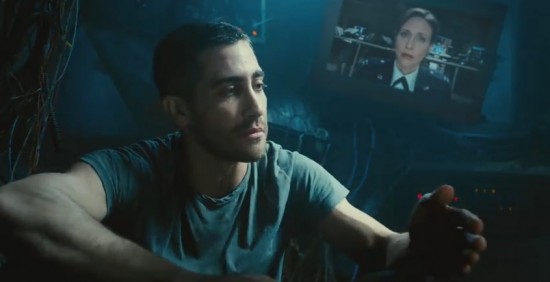
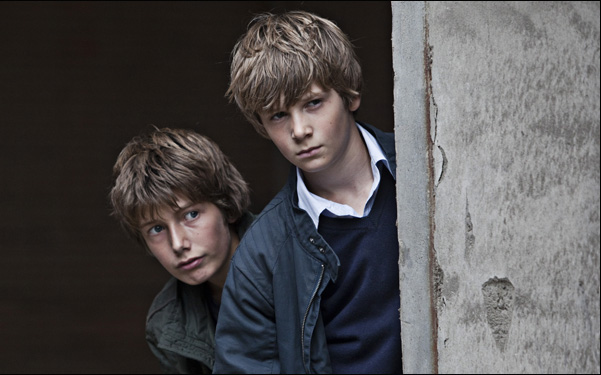
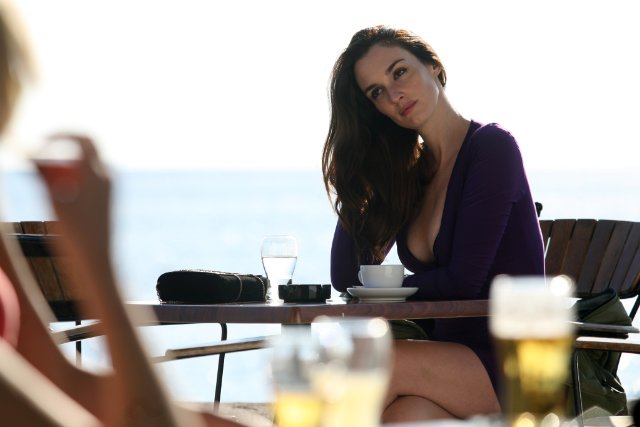

No Responses to “ Back to the Source ”
Sorry, comments for this entry are closed at this time.